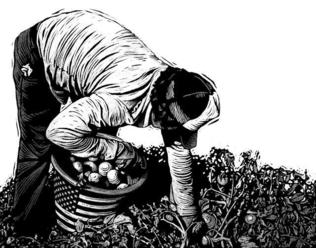Lawyers and advocates for farmworkers have asked the U.S. Department of Labor to block a large Washington state berry producer from displacing hundreds of domestic workers with foreign guest workers brought in under the federal government’s temporary foreign agricultural worker program, known as the “H-2A” program. H-2A workers are vulnerable to abusive employer practices and fearful of challenging unfair or illegal conduct because they hold only a temporary visa to work for a single employer and return home at the end of the season with no promise of being hired in a future year.
Sakuma Brothers Farms, located an hour north of Seattle in Burlington, WA is a major employer of migrant and seasonal berry harvest workers and supplies fruit to the gourmet ice cream maker, Haagen-Dazs. Familias Unidas por la Justicia, a union organized by Sakuma Brothers workers, sought improved wages and working conditions last season after workers were fired in retaliation for requesting improvements. They eventually filed a wage and hour class action lawsuit last fall against Sakuma for not receiving rest breaks and violations of their rights under the federal AWPA.
In a letter sent yesterday to the Department of Labor, the DC-based advocacy group Farmworker Justice and Seattle law firm Schwerin Campbell Barnard Iglitzin & Lavitt LLP urged the Department to deny Sakuma’s application for foreign H-2A workers. The letter asserts that the farm is acting to punish the Familias Unidas workers for seeking better wages and working conditions by replacing them with H-2A workers.
Sakuma Brothers filed an application this month for 438 H-2A workers for the summer season. The program requires that they demonstrate a shortage of available farmworkers in the United States. The law also requires Sakuma to contact its workers from 2013 and seek their return to work. Familias Unidas has already sent Sakuma letters from more than 460 of its members declaring their intent to return to work this season.
“How can Sakuma Brothers tell the federal government they have a domestic labor shortage when we have delivered over 460 pledges from workers who were employed at Sakuma last year?” asks Ramon Torres, one of the leaders of Familias Unidas.
“It is clear that Sakuma Brothers Farm seeks to displace domestic workers who have sought better wages and working conditions,” said Bruce Goldstein, President of Farmworker Justice. “The H-2A workers that Sakuma has requested do not have the same protections or ability to demand fair wages and working conditions, leaving them vulnerable to employer exploitation.”
“Using the H-2A temporary agricultural guestworker program as a means to retaliate against workers seeking better wages and working conditions violates the spirit and intent of the program,” said Laura Ewan, attorney at Schwerin Campbell Barnard Iglitzin & Lavitt. “If a worker applying for these positions also wishes to participate in labor organizing or other concerted labor activities, such participation does not create a valid job-related reason for denying the worker employment. Allowing these workers to be rejected for such reasons would deprive them of labor rights they enjoy under state law.”
Read moreWashington State Berry Farm Seeks to Displace Domestic Workers with Foreign Workers


